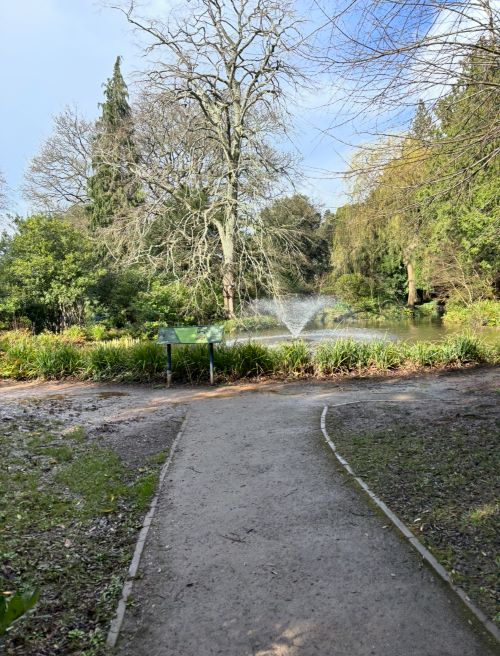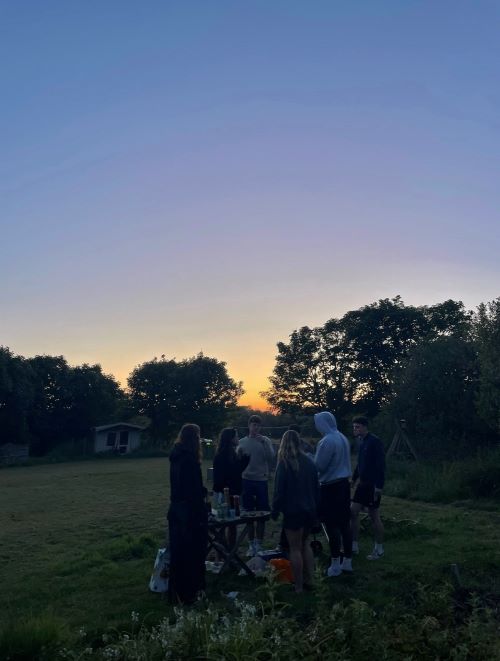Hi everyone! I’m Emily, a first year Modern Languages student at the University of Exeter. This time last year, when I was in same position as many of you are now, I knew I wanted to go to university but I wasn’t completely sure what I wanted to focus on. I had lots of different interests and didn’t like the idea having to narrow this down to just one path. That’s what really drew me to the University of Exeter. From the moment I started looking into it, I could see how flexible the degree options were and how easy it was to shape your course around what you actually enjoy. Exeter allows you to explore different areas and build them into your degree title in a way that suits you and also stands out to employers.
But university isn’t just about the course you choose. One of the biggest things I’ve realised since starting is that it’s also about everything else you learn outside of lectures. You gain independence, confidence, and a whole mix of life skills that are just as important as what’s on your degree certificate. Exeter creates a space where you can advance at your own pace, meet new people, get involved in sports and societies, and take advantage of amazing opportunities like networking with employers and studying abroad or doing a year in industry.
In this blog, I’m going to talk through some of the things that stood out to me as making a degree at Exeter a truly valuable experience.
Tailoring Your Degree To Suit You
One of the reasons that I was particularly drawn the University of Exeter is the flexibility of choosing modules from outside your discipline. This is often referred to as ‘modularity’: the option to use spare credits to study modules from a range of different subjects! Personally, I have done a range of modularity options, integrating modules from politics to teaching modules into my degree. This is a really fun and interesting way to explore your interests and try new subjects without the pressure of having to base your whole degree around it.
Another amazing way that Exeter lets you tailor your degree is the option to add an extra subject to your degree title. This is the “With Proficiency in…” pathway, and it means you can study another subject alongside your main onewithout having to do a joint honours degree or overload yourself. For me, this meant I could focus on Portuguese as my main subject, but still keep studying French and explore something new with TESOL (Teaching English to Speakers of Other Languages). What I really like about this is that it’s not just an extra module you squeeze in somewhere. It’s fully integrated, with proper teaching and assessments, and it counts as part of your degree. You can do this with loads of different subjects, including languages, TESOL, entrepreneurship, sustainability, sport, law and more and is available to students across lots of different degrees. This pathway means that when I graduate, my degree title will be “Modern Languages (Portuguese) with Proficiency in French and TESOL,” which shows the full range of what I’ve worked on during my time here.



This makes your degree much more versatile. You’re not just a specialist in one narrow area- you have acquired a range of knowledge and skills that you can carry into different careers. It’s something employers really value, especially when it shows up in your degree title. It proves you’ve gone beyond the basics and taken the initiative to learn more.
Real-World Experience: Study Abroad and Year in Industry
One of the things that I am most excited about as part of my course is the year abroad. In my third year, I’ll be heading to Brazil to study at one of Exeter’s partner universities. I’ll be studying there for the full academic year which will provide me with the opportunity to immerse myself in a new culture and improve my Portuguese language skills. Many students claim that their year abroad was one of the best years of their life – the confidence you gain and things that you get to experience are truly priceless.
As a Modern Languages student, a year abroad is built into my course, however this is also an option for most other degrees as well! You can choose to either work or study abroad, and you can rest assured that that this isn’t something you have to organise on your own. The University’s Global Opportunities team is there to support you from start to finish and can help with any questions that you may have. They help with placements, applications, visas, accommodation and everything in between. Additionally, because the Year Abroad is built into the course, if you choose to study, the credits you earn all count towards your degree!

If a Year Abroad doesn’t suit you, many courses also offer the option to do a Year In Industry. This lets you work in a job related to your subject for a full year, giving you proper experience before you even graduate. It’s a great way to build your CV, try out a career path, and make industry contacts that can help you land a job after graduation.
If you don’t want to commit to a whole year, there are also summer programmes, internships, and short-term placements available. Whatever your goals are, Exeter offers flexible ways to gain real-world experience that goes beyond the classroom—and that makes a huge difference when it comes to finding work after uni.
What adds even more value to your degree is the free access to the University of Exeter’s Career Zone—a dedicated career support service offering one-to-one guidance, CV and cover letter reviews, interview coaching, and workshops on networking and application skills.
As part of this support, you can take part in mock and video-based interviews using tools like Interview 360, or practice your skills in a live peer-feedback setting through events like The Interview Experience. Both opportunities are designed to build your confidence and polish your technique under realistic conditions
On top of this, there’s a wealth of webinars and skill sessions—including support with assessment centres, LinkedIn profiles, and ensuring your applications really stand out— all available at no extra cost, further enhancing how your degree prepares you for life after university!
Gaining Independent Skills
Moving away to university is a big step, and one of the most valuable things you gain isn’t just academic – it’s personal growth. For a lot of us, it’s the first time living away from home. Suddenly you’re doing your own food shop, managing your own time, making your own appointments and figuring it all out as you go.
But you’re not doing it completely alone. One of the things I really love about Exeter is how much support is available. From wellbeing services and academic tutors to peer mentoring and the Students’ Guild, there are people you can turn to whenever you need help, whether that’s with uni work, mental health, or just adjusting to life here. The campus also has all the facilities that you will need right on your doorstep, from a doctors to food shops and a library.

Sport, Societies, and the Campus Experience
Another massive part of life at Exeter is sport: whether you’re into team sports, gym workouts, running, or something more low-key, there’s something for everyone. The Sports Park gym on Streatham Campus is equipped with two floors: a top floor for cardio and a bottom floor more focused on free weights. There are also several outdoor pitches, the covered courts and even an outdoor swimming pool. Exeter is far from short of facilities!

If competitive sport isn’t really your thing there are also casual and social leagues. Beyond sport, there are over 300 societies to choose from, covering everything from languages, music, and politics to niche hobbies. You can get involved at any level, whether that’s just turning up to weekly meetings or running for a committee role, and many are free which provides a great way to add value to your time at uni and enrich your experience without having to worry about costs. I would recommend getting involved in something as this can be one of the best ways to meet people, stay active, and switch off from academic pressure. It also helps you to feel part of a wider community on campus.
Another amazing way to get involved is by taking part in a volunteering opportunity: The Students’ Guild runs student-led projects such as the Exeter Student Volunteers (ESV), the Dog Walking Project, Homeless Action, and more, so there’s something meaningful for everyone to be a part of.
All volunteers receive training and ongoing support from the Guild and this is a great way to give back to the community whilst also developing highly transferable skills – from leadership and teamwork to communication and organisation – that will look great on your CV. Many roles also align closely with academic or personal interests, so you can support causes you care about while still staying connected to your studies. Plus, it’s a fantastic way to meet new people who are equally passionate. Participating in these activities can even count towards the Exeter Award, a scheme recognising engagement in volunteering, sport, or music alongside your studies.
Supportive Teaching That Makes You Want to Learn
The University of Exeter is part of the Russell Group, which means it’s recognised for academic quality and research. But what’s been just as important to me is the atmosphere in the classroom. My lecturers don’t just stand at the front and talk – they actually want you to engage with what you’re learning, and you are surrounded by like-minded students who are eager to learn and share their thoughts. The teaching here is supportive but also pushes you to think critically. You’re not just memorising facts for an exam, you’re learning how to apply ideas, question assumptions, and build your own perspective. Because many lecturers are also active researchers, you’re being taught by people who are passionate about their subjects and have a lot of knowledge surrounding it.
There is also a lot of misconceptions that all courses are taught in huge lecture theatres where no one talks, butfor many subjects this just simply isn’t the case! In my Modern Languages course for example, the class sizes are small enough that you are encouraged to discuss ideas wherever possible and to ask questions, take part in discussions and bring your own ideas to the table, which I absolutely love!
So, Is It All Worth It?
For me, definitely. A degree is an incredibly valuable experience – but not just because of the piece of paper at the end. It’s the journey that comes with it: the people you meet, the opportunities you take, and the skills you build along the way. The University of Exeter has given me the freedom to shape my degree around what I care about, the support to grow as a person, and the chance to do things I never imagined, like living in Brazil, studying three different subjects, and exploring new career pathways. It’s not just about studying one subject for three years. It’s about becoming more independent, questioning things in life and thinking about them critically, and immersing yourself in a supportive, friendly environment where the opportunities are limitless. And that, in my opinion, is where the real value lies. But don’t just take my word for it – come and experience it for yourself!

